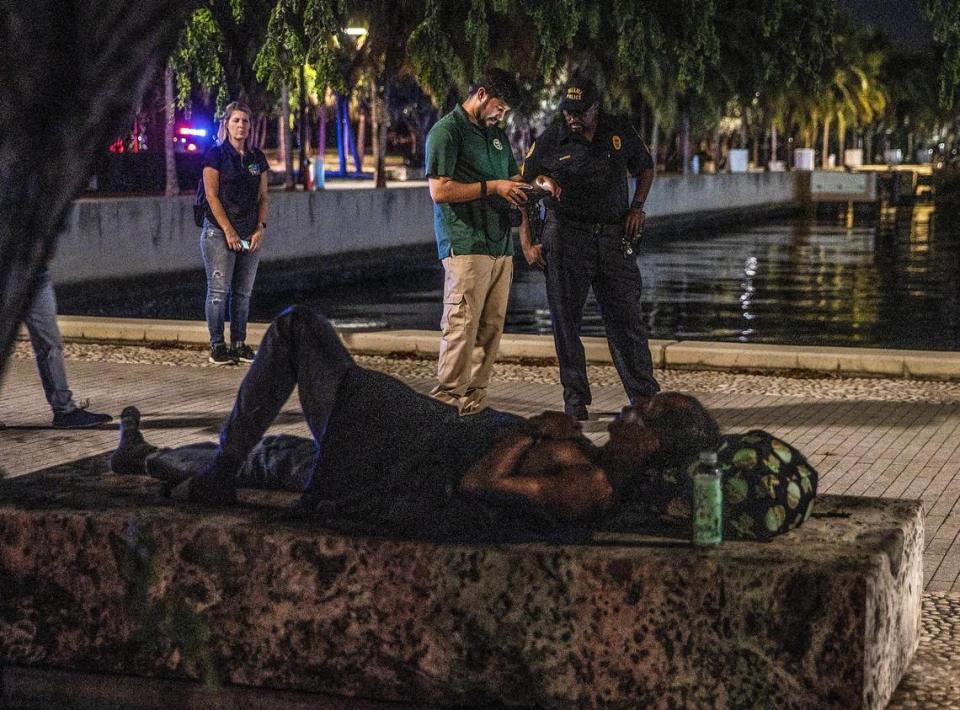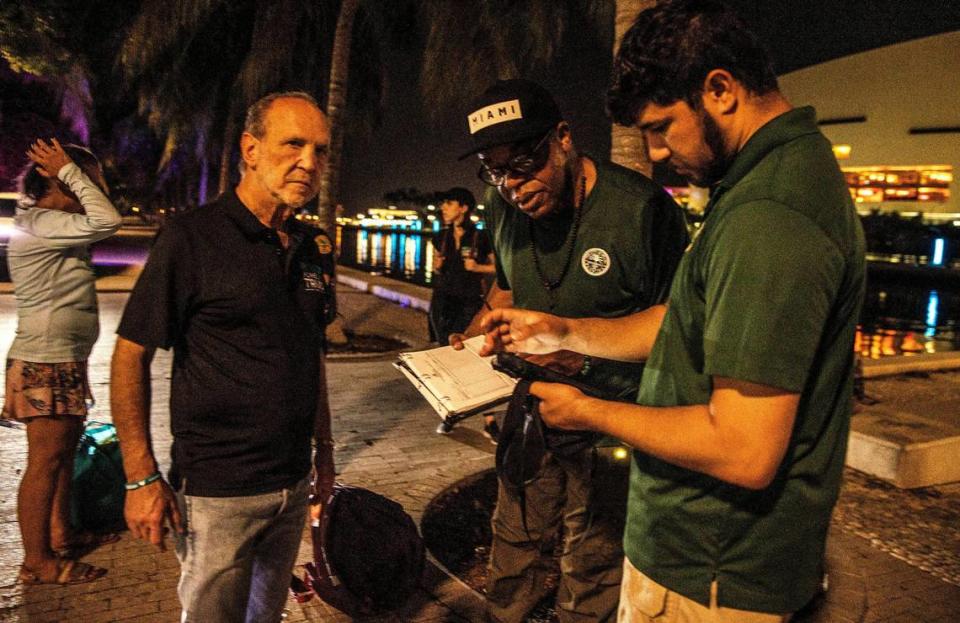‘We can’t coexist anymore’: Miami Beach weighs outdoor sleeping crackdown for homeless
Miami Beach officials are considering new measures intended to limit the presence of homeless people in public places, including legislation that could subject people sleeping outdoors to arrest if they don’t accept placement in a shelter.
For months, the city has been grappling with how to take a more aggressive enforcement approach toward the homeless amid an uptick in the city’s homeless population and complaints from residents.
At a City Commission meeting Wednesday that saw a slew of proposals on the agenda, elected officials directed the city attorney’s office to draft legislation that mirrors an ordinance in Orlando — a “no camping” law that bans sleeping outdoors on public property in most cases and was upheld in 2000 by the United States Court of Appeals for the 11th Circuit.
An initial vote on the proposal is expected at the next commission meeting in September.
“We have to have the enforcement, and it has to be more vigorous,” City Commissioner Steven Meiner said during Wednesday’s meeting. “As much as we can push the envelope, let’s do it.”
The homeless population of Miami Beach was 235 in January, according to the latest count by the Miami-Dade County Homeless Trust, an increase from 167 last August and the city’s highest count in more than a decade. There were 608 homeless people counted in the city of Miami. Those figures account for people living on the street outside of shelters.
The numbers pale in comparison to cities like San Francisco, which reported more than 7,700 people experiencing homelessness last year. But Miami Beach Mayor Dan Gelber and other city officials have pointed to San Francisco and other coastal cities as examples of what they hope to avoid.

Commissioner Kristen Rosen Gonzalez, who has called for the use of reserve police officers or armed private security guards to patrol areas with high concentrations of homeless people, said anecdotes she’s heard from residents about the homeless in Miami Beach — such as a man masturbating and a couple having sex in front of children in Collins Park — make her believe more action is needed.
“We can’t coexist anymore without this [legislation],” Rosen Gonzalez said. “I’m on board for everything.”
Miami Beach already has a camping ban in place. But the existing ordinance says police must give people a warning with a chance to relocate before making an arrest, which can result in up to 60 days in jail and a $500 fine.
The existing ordinance also says people must be given a chance to enter a homeless shelter — and that, if no beds are available, an arrest can’t be made.
The availability of shelter was key in the decision to uphold Orlando’s ordinance by the 11th Circuit, which noted that a shelter in downtown Orlando was open at all hours and had never reached capacity.
“At the end of the day, if there are not shelters available, it makes it very difficult to meaningfully address the homeless,” Gelber said.
A ‘compassionate’ approach?
Commissioner Alex Fernandez framed the proposal as “compassionate,” saying that allowing people to sleep outside poses a public safety risk to the homeless because they are “vulnerable in the elements.”
But homeless advocates have challenged the idea that temporarily forcing homeless people off the street is the most effective or compassionate approach.
Stephen Schnably, a University of Miami law professor and ACLU cooperating attorney who worked on the landmark Pottinger case that addressed homelessness in the city of Miami, said there are many reasons why a homeless person may not want to accept placement in a shelter.
For one, he said, shelters only let people stay temporarily, often for 24 hours, and don’t always let people bring all of their belongings inside.

Schnably also noted that there aren’t any homeless shelters in Miami Beach, meaning people would potentially be forced to leave a city they call home.
“It’s really using your arrest power to put people to a choice of jail or exile,” Schnably said. “Really, it amounts to saying you can’t be homeless in the city of Miami Beach.”
In the Pottinger case, which prevented Miami police from arresting homeless people for “life-sustaining” activities until a consent decree was terminated in 2019, police were required to offer shelter within the city of Miami before making an arrest, Schnably said.
Miami Beach has an agreement with Camillus House in Miami for 12 designated shelter beds.
Late last year, the city beefed up enforcement by park rangers in Collins Park and other areas where homeless people tend to congregate. In a February memo, City Manager Alina Hudak said the initiative had resulted in 13 shelter placements, 59 arrests and 95 trespass warnings.
The city also employs a team of municipal prosecutors that focuses on “quality of life” offenses, such as drinking in public and entering a park after hours. In 2019, the Miami Herald found that two-thirds of the team’s cases involved homeless defendants. The program has expanded in the years since.
City commissioners placed a variety of other proposals on Wednesday’s agenda, including a ban on lying down on Lincoln Road, the use of secured trash bins and dumpsters to prevent rummaging, and a crackdown on loitering near beach entrances. In 2020, the city closed fountains on Lincoln Road because homeless people were seen bathing in them.
But city attorneys said the best way to achieve officials’ goals while preventing a legal challenge would likely be to mirror the Orlando ordinance, given that it was upheld by an appellate court and could apply citywide.
Investing in housing
In addition to their discussion of enforcement measures Wednesday, commissioners called for a special election in November 2024 to impose a 1% tax on food and beverage sales to help fund the county Homeless Trust and domestic violence centers.
“We have to provide the funding necessary, first and foremost, for housing,” Miami Beach Commissioner Ricky Arriola said. “You can’t cure homelessness without providing housing as an element.”
The sales tax, which the Florida Legislature created in 1993, is collected at restaurants in cities across Miami-Dade County except for those that already have a resort tax: Miami Beach, Surfside and Bal Harbour. In 2021, Miami Beach voters signaled support for imposing the additional tax in a referendum, but the Legislature didn’t amend its laws to allow it until earlier this year.
If voters approve a referendum again next year, Miami-Dade County commissioners would need to agree to collect the tax.
Miami Beach officials have gone back and forth in recent months with Ron Book, a lobbyist for the city in Tallahassee and the chair of the Miami-Dade Homeless Trust, as Book has requested money from the city to support new permanent housing efforts the trust is pursuing.
The city has so far committed $1 million, and has been negotiating with the Homeless Trust over the terms of an additional $1 million that would fund 45 permanent housing units and 10 shelter beds for the Miami Beach homeless population at locations outside the city.
Miami Beach has made scant progress in adding affordable housing units over the past decade, while housing costs have skyrocketed in the tourist hub. Average rent for a one-bedroom apartment in the city is $2,600, according to the real estate website Zumper.
“The solution to this problem, long-term, is more affordable housing,” said Schnably.

